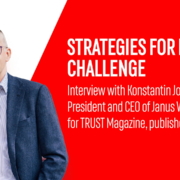Interview with Konstantin Josseliani, President and CEO of Janus Worldwide, for TRUST Magazine, published by WKO
STRATEGIES FOR EVERY CHALLENGE
Janus Worldwide is one of the leading providers of translation and language services thanks to its business agility and adaptation to a constantly changing business world.
Janus Worldwide was founded in 1996, based on the valuable combination of management and technology experience Konstantin Josseliani had gained at SAP. When SAP closed its localization department, Konstantin decided to use this knowledge to set up his own company. Janus began its journey with a small office and a few employees, which laid the foundation for later growth.
Today, Janus Worldwide has its headquarters in Cologne, Germany. What is particularly noteworthy, however, is that the company has established a global network of ten offices worldwide including in Albania, Bulgaria, China, Germany, the UK, Kazakhstan, Panama, the Czech Republic, Ukraine and Austria, as well as a new office in Georgia so it can be closer to its customers and operate efficiently in different time zones in line with the “follow the sun” principle. This means Janus can guarantee 24/7 support.
What distinguishes Janus Worldwide from other translation companies that also offer localization services?
Konstantin Josseliani: We focus on industry-specific solutions. Since the company was founded, Janus Worldwide has worked closely with IT companies to provide localization services for software and technical devices. Today, the company serves Fortune 500 customers and offers tailored solutions for software customization and interface testing in various industries. These include fintech, industry, energy, medicine and life sciences, multimedia, and gaming. We offer localization in up to 80 languages simultaneously, lowering costs and making the process more efficient for customers, as they can cover all their language needs with just one provider. We have around 400 employees around the world who are highly qualified in linguistics and technology, and ensure the company’s high-quality standards are met.
What are localization services?
Localization is much more than just translating texts. It is about adapting products and services to the cultural, linguistic and technical particularities of a target market. At Janus Worldwide, this process covers a wide range of tasks, including the translation of marketing materials, technical documentation and multimedia content. The aim is to help customers successfully branch out into new international markets and optimize their products for different countries at the same time. Technically adapting software, websites, or documentation to regional requirements plays a key role in localization. Both linguists and technical experts are involved in this process to ensure the functionality of a product is retained when adapting it to the specific needs of users in various languages.
What is special about the GTP 2.0 platform?
GTP 2.0 is a powerful SaaS platform that has been specially developed to optimize collaboration with customers. It enables users to follow the project status in real time, view detailed statistics, and request additional services such as express translations or quality checks. This innovative technical tool provides Janus Worldwide with a key competitive advantage by meeting the growing demand of customers for user-friendly and technologically advanced solutions. The development of GTP 2.0 was a significant milestone for Janus Worldwide. The process required the involvement of both creative and technical specialists from the company to successfully design and implement the platform. It was a challenging but very worthwhile step.
What is the current situation in the translation industry?
The translation industry is currently undergoing profound technological changes. Innovative technologies are the key to further development. Translation companies are operating more and more like IT companies, as project management tools, translation automation and machine translation have become indispensable components of the business. A key trend is the combination of machine translation with post-editing. Despite the considerable progress that has been made in machine translation quality, post-editing is still essential, especially when it comes to technical texts, in order to avoid serious errors. At Janus Worldwide, we use machine translation for large amounts of data, but the final quality is always ensured by our experts. Customer requirements have also changed as they now expect not only translation services, but also technological solutions that make the process smoother and more efficient.
Read the new issue of TRUST magazine:wko.at/wien/gewerbe-handwerk/gewerbliche-dienstleister/final-trust2402-v5.pdf





